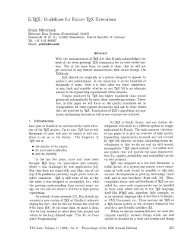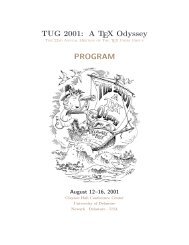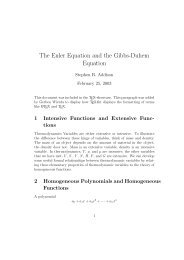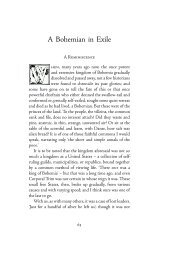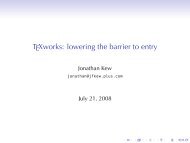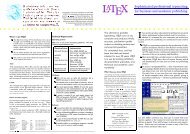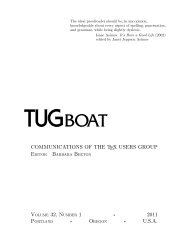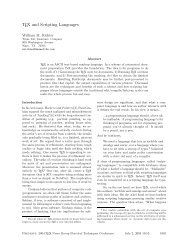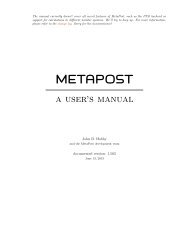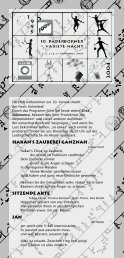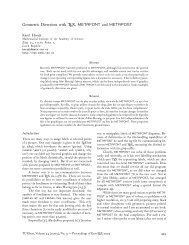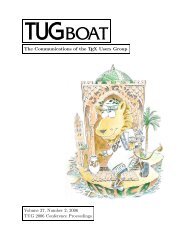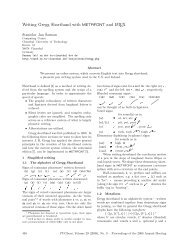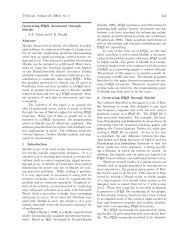Complete issue 10:1 as one pdf - TUG
Complete issue 10:1 as one pdf - TUG
Complete issue 10:1 as one pdf - TUG
You also want an ePaper? Increase the reach of your titles
YUMPU automatically turns print PDFs into web optimized ePapers that Google loves.
<strong>TUG</strong>boat, Volume <strong>10</strong> (1989), No. 1<br />
Software<br />
News from the V O R Project ~<br />
Michael A. Harrison*<br />
Computer Science Division<br />
University of California, Berkeley<br />
Introduction<br />
This is a report on the current state of the V i m<br />
project <strong>as</strong> it relates to the community. The<br />
project h<strong>as</strong> been running for over three years. Our<br />
research funding h<strong>as</strong> been extended, but we will be<br />
evolving in non w-compatible ways. We expect<br />
to publish traditional research papers on the novel<br />
<strong>as</strong>pects of our work. Cf. [7] for a summary of a<br />
number of <strong>issue</strong>s underlying this work. Design <strong>issue</strong>s<br />
are discussed in [6].<br />
This brief summary will tell you what software<br />
we will have available for use by the research community;<br />
it can be licensed commercially <strong>as</strong> well. By<br />
the time you read this report, all of the systems discussed<br />
should be available.<br />
The original goal of the VOW project w<strong>as</strong><br />
to create an integrated document preparation environment<br />
capable of producing high quality technical<br />
documents which involve mathematics, text,<br />
and graphics. In V O ~ both , source and target<br />
representations of a document are maintained and<br />
presented. The source representation refers to a m<br />
document in its original unformatted form; the target<br />
representation presents its formatted result. The<br />
user can edit both representations using a text editor<br />
and what is called a proof editor, respectively.<br />
Our editor is an Emacs-like editor written in our<br />
own VLisp (Vom Lisp). Changes made to <strong>one</strong><br />
representation propagate to the other version automatically.<br />
It is e<strong>as</strong>y to support source modifications<br />
that cause the target representation to change.<br />
but a major challenge w<strong>as</strong> the transformation from<br />
a target version back to the source version. The<br />
original design ide<strong>as</strong> are described in [6]. The system<br />
reformats a document and redisplays it on the<br />
screen incrementally. Only the part of the document<br />
or the subregion of the screen that is affected<br />
by recent changes is reprocessed. The document<br />
*Sponsored by the Defense Advanced Research<br />
Projects Agency (DoD), monitored by Space and<br />
Naval Warfare Systems Command, under Contract<br />
No. N00039-88-C-0292. Additional funding came<br />
from the California MICRO program (Grant 88-083<br />
in conjunction with IBM).<br />
environment h<strong>as</strong> support for automatic production<br />
of indexes for books [8], support for bibliographic<br />
material (31, spelling checkers, and other documentrelated<br />
utilities. Cf. [5].<br />
Our current system uses workstations with bitmap<br />
displays running under the UNIX operating system<br />
and the X window system [12]. Some subsystems<br />
also support SUNVIEW. In order to provide<br />
device independent high quality graphics, we use<br />
Postscript [1,2] and have written a Postscript interpreter.<br />
We are developing methods to interpolate<br />
Postscript into our displays. Future research<br />
plans include supporting composite objects, symbolic<br />
mathematics, hypertext documents, audio, live<br />
video, etc. A key element will be access to a persistent<br />
object b<strong>as</strong>e which is important for many applications.<br />
The V O prototype ~ is running and did p<strong>as</strong>s<br />
the traditional Trip test [lo], <strong>as</strong> well <strong>as</strong> the more<br />
demanding Trip* test required of incremental document<br />
processors [9]. Because the w processor is<br />
b<strong>as</strong>ed on Pat Monardo's C-?'E)i. the system is f<strong>as</strong>t.<br />
Some timing data are reported in [9]. The most<br />
challenging part of V O R is ~ the reverse mapping<br />
mechanism. To handle some of the semantic difficulties,<br />
functions in VLisp are used to implement<br />
reverse mapping. Only a few are implemented in<br />
the current prototype.<br />
The V O prototype ~ will be available on the<br />
distribution sometime in January 1989. As the system<br />
currently stands, it will require a great deal of<br />
work to make into an industrial-strength system. It<br />
served our purposes admirably because we found out<br />
what we did right (and wrong) and this will influence<br />
the design of its successor.<br />
We have produced another system called<br />
INCTEX, derived from V i m , which we think<br />
will be useful immediately to the community.<br />
INCTEX is an incremental w<br />
It is very<br />
f<strong>as</strong>t and is more efficient in its use of memory than<br />
V m . It supports quiescence checking, convergence<br />
testing, etc. (cf. [9] for definitions). It creates<br />
a DVI file and checkpoints some state information for<br />
each page on the first run. On subsequent runs. only<br />
those parts of the document which have changed<br />
are reprocessed. When running I4?'E)i incrementally,<br />
no unnecessary p<strong>as</strong>ses are used. INW, unlike<br />
V-, is editor independent and is designed<br />
to avoid parts of the operating system which would<br />
hamper porting.<br />
INCTEX h<strong>as</strong> not p<strong>as</strong>sed the Trip' test <strong>as</strong> of this<br />
writing, but works well enough to process many research<br />
papers and a 200-page dissertation. IIGTEX<br />
'Any flavor of T@ you want, not just plain m.



